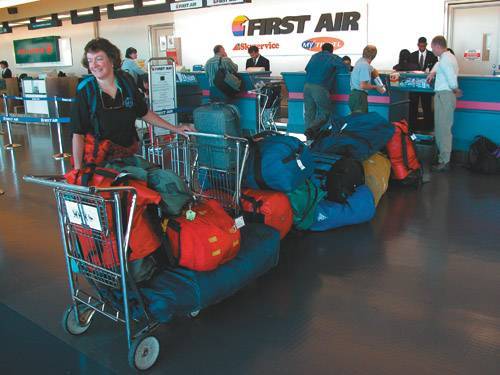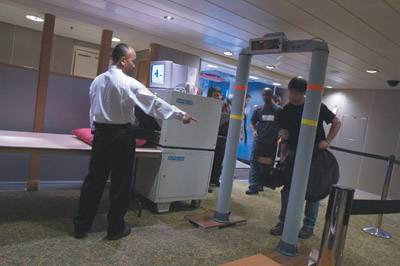Taking Your Show on the Road
| There's probably nothing more exhausting than travel. How on earth are you supposed to enjoy going some place when the act of getting there takes so much of out you? These days, airplane travel is worse than ever. The lines are longer, the security is tighter, and the aggravation is out of this world (Figure 3.11). Figure 3.11. These days airplane travel is fraught with long lines and tight securityespecially if you are traveling with a lot of gear. (Photo by Reed
If you're traveling domestically, you can save yourself a bit of hassle by shipping some of your materials to and from your destination. You can ship big bulky items such as tripods and other camera supports with no problems, and doing so cuts down on the number of bags you carry with you. Often a photographer will ship ahead a change of clothing and a set of consumables (blank DVDs and CDs). This frees up the suitcase for photographic items you might need, but still allows you wardrobe flexibility. Insure the package, and if it gets lost in transit you can even head out to a shop and buy yourself some new clothes, which is easier to do than replacing an expensive piece of camera gear that gets lost in transit. Reducing the number of bags you bring along is a good idea regardless of your destination. Airlines are paying closer attention to both the number of pieces and the weight of luggage and are levying hefty extra charges for excessive weight or pieces. Many photographers I know ship their clothing to their destination, using the allowed weight for more important travel gear. If you're traveling to a hotel, call ahead and ask if you can ship packages care of the hotel for your arrival. Almost all will happily oblige, as long as you write your name and your check-in date on the box. TIP These days the Federal Aviation Administration (FAA) allows one carry-on item and one personal item (think purse, briefcase, or small computer bag) per passenger, but that could change at any moment. This doesn't leave a lot of room for your camera gear. You always want to transport fragile items with you as carry on, so pack everything else in luggage that can be checked. International flights have even stricter regulations about weight, and many won't let you board a plane if your gear exceeds their weight limits by so much as an ounce. TIP When traveling internationally, bring extra cash along to help deal with any billing emergencies. "It once cost me about $400 in excess baggage charges to get out of Kenya," explained Blue Pixel photographer Bill Durrence. "In part, the problem was a crooked gate agent who ripped me off by lowering the weight amount allowed on the plane. I had no choice but to pay the extra or leave the gear there." Screening RoomIncreased security at the airport is great for everyone, but it slows down travel. If you're traveling with camera gear, show up two hours early, and be prepared to wait around. Most Transportation Security Administration (TSA) officials have never seen the types of pro camera gear some people take along on flights, and they may ask you to show them that everything works. Be friendly and polite, do not joke around, and be sure to cheerfully do anything you're asked to do. As you get to the metal detectors, take off your shoes and coat and put them in one of those ubiquitous gray plastic bins along with any metal you might have (don't forget your belt). Your laptop goes in its own bin; remember to put it through last so that it comes out at the same time you pass through the detectors. Figure 3.12. Security and metal detectors are now a part of travel from airlines to cruise ships. Be prepared for the extra time and trouble involved. (Photo by Reed Hoffmann)
The TSA personnel are doing their jobs, and they have an easier time doing that when you're prepared and ready to go when it's your turn. If you have an issue, ask to speak to a supervisor, but remember that you're unlikely to get your way, and you'll end up delaying your trip. Information on TSA regulations and programs can be found at www.tsa.gov/public, and those for the FAA can be found at www.faa.gov. Practically SpeakingEvery piece of equipment you travel with should be written down on a piece of paper, along with the serial numbers of anything expensive. Should you need to file a police report due to theft or loss, it'll be much easier if you have the serial numbers. If you're traveling to a country that sells the same equipment you're bringing into the country, travel with copies of your original sales receipts so you're not asked to pay duties by an overzealous customs agent. TIP It's also vital to carry a photocopy of your passport's cover and main pages; this will facilitate a replacement if you lose your passport. Leave another copy with someone who has a fax machine back home, so they can fax it to you if you lose your copy. Information on international travel regulations is available at the State Department's Web site. Check with the Department about any visas needed for your trip, and stay up to date on documentation you need to cross borders. Rules about international crossings can change daily. On one trip I was required to show a passport to enter Canada, but no one checked my documents when I crossed from Germany into Holland. Vaccinations and Travel HealthMany hospitals, larger clinics, and county health services have a travel health department that can advise you regarding vaccinations you will need when traveling to particular destinations, and also give you the vaccinations. The two best Internet resources for travel heath information are the Web sites of the Center for Disease Control (www.cdc.gov/travel) and the World Health Organization (www.who.int/ith/en). Preparation, Preparation, PreparationProper preparation can make the difference in a fantastic travel experience and an unmitigated disaster. You'll still need to think on your feet to handle the unexpected (which I'll cover in the next chapter), but if you take the time to plan a perfect trip, you'll be ready to shoot before you even get there. |
EAN: 2147483647
Pages: 79

